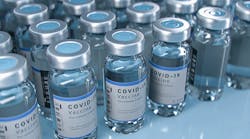To meet the urgent need for COVID-19 related therapies and vaccines early in the pandemic, Thermo Fisher Scientific, a world leader in serving science with annual revenue of approximately $35 billion, had to expand contract manufacturing capacity quickly and dramatically at its plant in Greenville, N.C.
As part of the expansion, the 130,000 sq ft plant has added to and upgraded its existing distributed control system (DCS) to accommodate the production of two vital pharmaceuticals during the pandemic: first, the antiviral drug Veklury (remdesivir), FDA-approved for the treatment of patients with COVID-19 requiring hospitalization, and the Moderna COVID-19 vaccine.
In late 2020, ramping up production of the antiviral drug for those hospitalized due to the pandemic was crucial, according to Chris Gepfert, regional sales manager at NovaTech LLC's process division, which specializes in DCSs and continuous control system architectures. Gepfert was involved with DCS implementation at the Greenville plant, which he notes entailed adding a new production line, including onsite construction and required FDA testing.
According to Gepfert, NovaTech was fully aware of the urgency of the project. “With the constrained supply chain, it was difficult to meet the tight timeline, but we prioritized the effort to meet the deadlines,” he says.
“For contract manufacturing organizations (CMOs), the need to quickly produce various vaccines or therapeutics, and then ramp up volume, can occur rather suddenly, so we were on standby and ready to implement the system architecture necessary for increased production,” he adds. “When there can be a new project or a new contract awarded from week to week, the DCS must be flexible enough to accommodate whatever is needed quickly, whether it's new I/O equipment cabinets, new process control modules or new services.”
In the Greenville plant’s case, Nova-Tech’s D/3 DCS was already in use and was leveraged in the plant’s expansions. Custom graphics, built using dynamic objects from an extensive library, make it easy for the operator to control the process, enter information, and interact with sequence programs.
The CMO and NovaTech collaborated to provide the needed flexibility for the new suite expansions, according to Gepfert. “They do a lot internally, and we have our engineers full-time, onsite to offer immediate support as well,” he adds.
When a critical, high-volume vaccine contract was awarded to the CMO, the plant’s DCS system was robust and flexible enough to handle the added production.
According to a recent CNBC.com article, “Moderna said Thermo Fisher’s commercial manufacturing site in Greenville, N.C., will be used to provide fill/finish manufacturing services and supply packaging for hundreds of millions of doses of the vaccine.”
Gepfert points out that for high-volume production of this sort, CMOs often require automation to increase production and minimize the need for operator involvement, while reducing potential error.
To implement automation at the plant, the DCS uses NovaTech's 8000 series remote I/O platform, which is highly integrated with the D/3 System. The system enables significant batch process control and automation using NovaTech's Sequence and Batch Language (SABL) and S88-based layered batch management package called FlexBatch.
“The pandemic has upended routine CMO production planning, so a DCS must be flexible and capable enough to make any required changes to vaccine and therapeutic manufacturing rapidly and easily,” concludes Gepfert. “Having the right DCS in place and working with a supportive vendor is crucial today for CMOs to respond as quickly as the market requires.”




